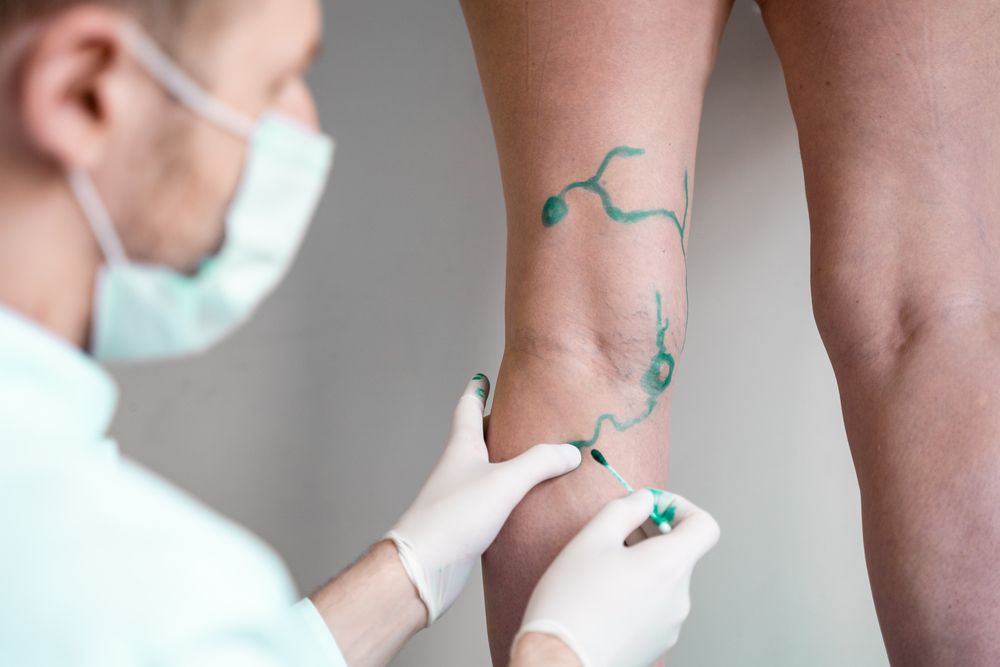When it comes to vascular health, there’s a wide array of conditions that may require medical intervention. From the treatment of varicose veins to complex arterial bypass surgeries, understanding common vascular procedures, knowing what to expect, and making an informed choice about your vascular surgeon are crucial steps in your healthcare journey.
The team at The Surgical Clinic in Nashville, Tennessee wants to empower you with the options available to treat a wide variety of vascular conditions. We also want to provide you with additional insight on the most common vascular procedures and offer tips on how to choose the right vascular surgeon in Tennessee.
Let’s take a closer look at some of the most common vascular procedures of today!
Top Vascular Procedures

Carotid Endarterectomy
For patients at risk of stroke due to carotid artery blockages, a carotid endarterectomy is performed to remove plaque buildup to prevent strokes. This procedure is essential for patients with carotid artery disease, a condition where plaque buildup narrows the carotid arteries, leading to reduced blood flow to the brain and increasing the risk of stroke or transient ischemic attacks (TIAs).
Additionally, femoral endarterectomy may be considered in certain cases to improve overall vascular health.
Complications such as infection at the incision site and restenosis, while possible, occur infrequently and are generally manageable with appropriate medical care. The surgery proves to be a critical intervention, offering a new lease on life for many patients.
Patients who undergo a carotid endarterectomy can expect a reduced risk of stroke and improved blood flow to the brain, leading to better overall vascular health.
Aortic Aneurysm Repair Options
Aneurysms are potentially life-threatening conditions where blood vessels bulge and weaken. Surgical options include open repair or endovascular repair using stents and grafts. Open surgery, involving a large incision to access and repair aortic aneurysms, has traditionally been the gold standard for treating large or complex abdominal aortic aneurysm and thoracic outlet syndrome.
Minimally invasive endovascular repair offers a less traumatic alternative for many patients. Endovascular aneurysm repair (EVAR) involves making small incisions to insert catheters that place a stent graft inside the aorta, sealing off the aneurysm and allowing blood to flow normally.
Embolization can also be used to block blood vessels to treat conditions such as aneurysms, AVMs, or bleeding.
Reducing recovery time and post-surgical discomfort, this minimally invasive procedure is a preferred option for many patients. Patients who undergo either aortic aneurysm repair option should expect follow-up care to ensure the aneurysm is successfully managed.
Lower Limb Revascularization Techniques
Lower limb revascularization is crucial for patients suffering from critical limb ischemia due to severe peripheral artery disease (PAD), as it restores blood flow to the legs and feet. This procedure is often indicated when conservative treatments fail to alleviate symptoms and improve blood flow.
Revascularization methods include bypass surgery, which uses either the patient’s vein or an artificial graft to bypass the blocked artery. Techniques like aortoiliac bypass, connecting the iliac artery to the common femoral artery, are also employed to restore circulation.
Monitoring the success of revascularization through postoperative care is vital. Surgeons check pedal pulses and perform ankle-brachial index tests to ensure that blood flow has been effectively restored. Techniques and treatments of this kind help patients regain mobility and improve their quality of life.
Endovenous Laser Ablation and Sclerotherapy
Varicose veins are swollen, twisted veins that can cause discomfort and aesthetic concerns. Treatments like endovenous laser ablation and sclerotherapy involve minimally invasive techniques to close off or remove these veins. If left untreated, varicose veins and venous ulcers, common vascular conditions, can lead to significant discomfort and complications.
Endovenous laser ablation uses a laser to heat and close off varicose veins, promoting blood flow and redirecting to healthy veins. Sclerotherapy is another option for patients with varicose veins, and it works by injecting a saline link solution into the varicose vein, causing it to shrink and eventually fade.
Alternative treatments like radiofrequency ablation are also available, providing additional options for patients.
To promote healing, patients are advised to wear compression stockings and take regular walks, putting pressure on their legs. Both of these treatments help to alleviate symptoms and prevent the progression of venous disease. Patients can expect improved blood circulation and a reduction in symptoms like pain, swelling, and heaviness in the legs.
Angioplasty and Stenting
Angioplasty involves using a balloon to widen narrowed or blocked arteries to improve blood flow, followed by the placement of a stent to keep the artery open. Stenting works by placing a small mesh tube into a narrow or blocked artery to keep the blood vessel open. These procedures restore overall blood flow and are commonly used for treating coronary artery disease and peripheral artery disease. Following these treatments, patients can expect improved circulation and reduced symptoms like chest pain or leg pain.
Thrombolysis
In cases of blood clots in deep veins, treatments like thrombolysis (clot-dissolving) procedures or insertion of filters can be necessary. Typically, a treatment like thrombolysis is used for patients who have deep vein thrombosis (DVT) or have suffered a stroke or pulmonary embolism. Patients who undergo a treatment like thrombolysis can expect prevention of complications like pulmonary embolism and restoration of healthy blood flow.
Limb Amputation: Last Resort for Severe PAD
In severe cases of peripheral artery disease (PAD), limb amputation may be the only viable option to prevent life-threatening complications such as gangrene. This drastic measure is considered when other treatments fail to restore adequate blood flow, and the patient suffers from intractable pain or severe infection. PAD complications, including blood clots and critical limb ischemia, often necessitate this last-resort procedure.
The decision to amputate a limb is never taken lightly, involving careful consideration of the patient’s overall health and quality of life. After amputation, patients undergo extensive rehabilitation and emotional support to adapt to their new circumstances and regain independence.
Dialysis Access Surgery
Dialysis access surgery is vital for patients with kidney failure, enabling them to receive life-saving hemodialysis treatments using a dialysis machine. It involves creating either an arteriovenous fistula or a graft to facilitate efficient blood flow during dialysis sessions.
An arteriovenous fistula, joining an artery and vein in the arm, is the preferred option due to its durability and lower complication rates. For patients who cannot receive a fistula, synthetic material grafts serve as a secondary option, providing reliable access to dialysis.
Catheters, typically reserved for temporary use or when other access types are not viable, are also used for dialysis access. Proper care of the dialysis access site is crucial to prevent infections and ensure long-term functionality, allowing patients to continue dialysis treatments without interruption.

Minimally Invasive Endovascular Procedures
In vascular surgery, minimally invasive endovascular procedures have emerged as a game-changer driven by advanced technology. These techniques significantly reduce recovery times compared to traditional surgical methods by restoring healthy blood flow and preventing complications, such as blood clot formation, without requiring large incisions or extended hospital stays.
Patients benefit from:
- Rapid recovery
- Excellent outcomes
- Less pain
- Fewer complications
Procedures such as balloon angioplasty and stenting are at the forefront of endovascular surgery. This procedure involves vascular surgeons using miniature surgical instruments and a wire mesh tube, or catheter, to reach the affected blood vessels through small incisions, including a thin tube. This minimizes blood loss and promotes quicker healing.
Patients who undergo these minimally invasive procedures often experience shorter hospital stays and can return to daily activities much sooner than those who opt for traditional open surgery. These techniques’ precision and efficiency, including small incision methods, have made them the preferred choice for many vascular conditions, including minimally invasive surgery.
What to Expect During Recovery
Recovery from vascular procedures varies depending on the surgery type. Patients may spend time under a doctor’s supervision for more complex surgeries, while outpatient procedures allow for quicker discharge. For instance, recovery from vascular bypass surgery may require a hospital stay ranging from two to seven nights.
Being minimally invasive, endovascular procedures usually result in shorter recovery times and less pain than traditional open surgery. Patients must adhere to specific recovery instructions following surgery, such as performing deep breathing exercises to prevent pneumonia and avoiding certain activities during the initial healing phase.
Long-term care involves lifestyle changes like quitting smoking, following a healthy diet, and managing chronic conditions to ensure the best outcomes. Vascular surgeons emphasize developing long-term relationships with patients to monitor recovery, maintain vascular health, and prevent vascular disease through comprehensive care.
Choosing the Right Vascular Surgeon
Now that we have shared different types of vascular care options, the next important step is to choose the right vascular surgeon for your vascular needs. Here are some key factors to look for when considering a vascular surgeon.
- Qualifications and Credentials: Ensure that the vascular surgeon is board-certified, has relevant training, and specializes in vascular procedures. Look for affiliations with reputable medical institutions and a track record of successful procedures.
- Experience: Experience matters in vascular surgery. A surgeon who has performed a significant number of procedures is likely to have honed their skills and techniques, leading to better outcomes.
- Patient Reviews and Testimonials: Read patient reviews and testimonials to gauge the surgeon’s bedside manner, communication skills, and patient satisfaction. Positive patient experiences can indicate a surgeon’s dedication to patient care.
- Hospital Affiliations: Consider surgeons who are affiliated with well-established hospitals or medical centers. These institutions tend to have advanced facilities and a comprehensive team of specialists to support your treatment journey.
- Consultation and Communication: During your consultation, assess the surgeon’s willingness to answer questions, explain procedures, and discuss potential risks and benefits. A transparent and open line of communication is essential for building trust.
Navigating vascular procedures can be daunting, but with the right knowledge, you can make informed decisions about your healthcare. From understanding common procedures and their outcomes to choosing a skilled vascular surgeon in Tennessee, you can take charge of your vascular health journey. Remember, your well-being is paramount, and finding the right surgeon to guide you through these procedures can make all the difference in achieving the best possible results.
Vascular Treatment with The Surgical Clinic
If you need vascular treatment or care in the greater Nashville area, contact The Surgical Clinic today. With multiple locations throughout middle Tennessee, you will be sure to find the right location for you. In addition to multiple location options, our vascular surgeons are top-tier with experience, skill, and credentials to show.
Contact us today to schedule an appointment or consultation to learn more about your options for better health through vascular treatment at The Surgical Clinic.

Dr. Julia Boll
Vascular Surgeon
VIEW PROFILE

Dr. JimBob Faulk
Vascular Surgeon
VIEW PROFILE

Dr. Brian Kendrick
Vascular Surgeon
VIEW PROFILE

Dr. Billy J. Kim
Vascular Surgeon
VIEW PROFILE

Dr. Allen Lee
Vascular Surgeon
VIEW PROFILE

Dr. Caroline Nally
Vascular Surgeon
VIEW PROFILE

Dr. Adam Richter
Vascular Surgeon
VIEW PROFILE

Dr. Mark Shelton
Vascular Surgeon
VIEW PROFILE



